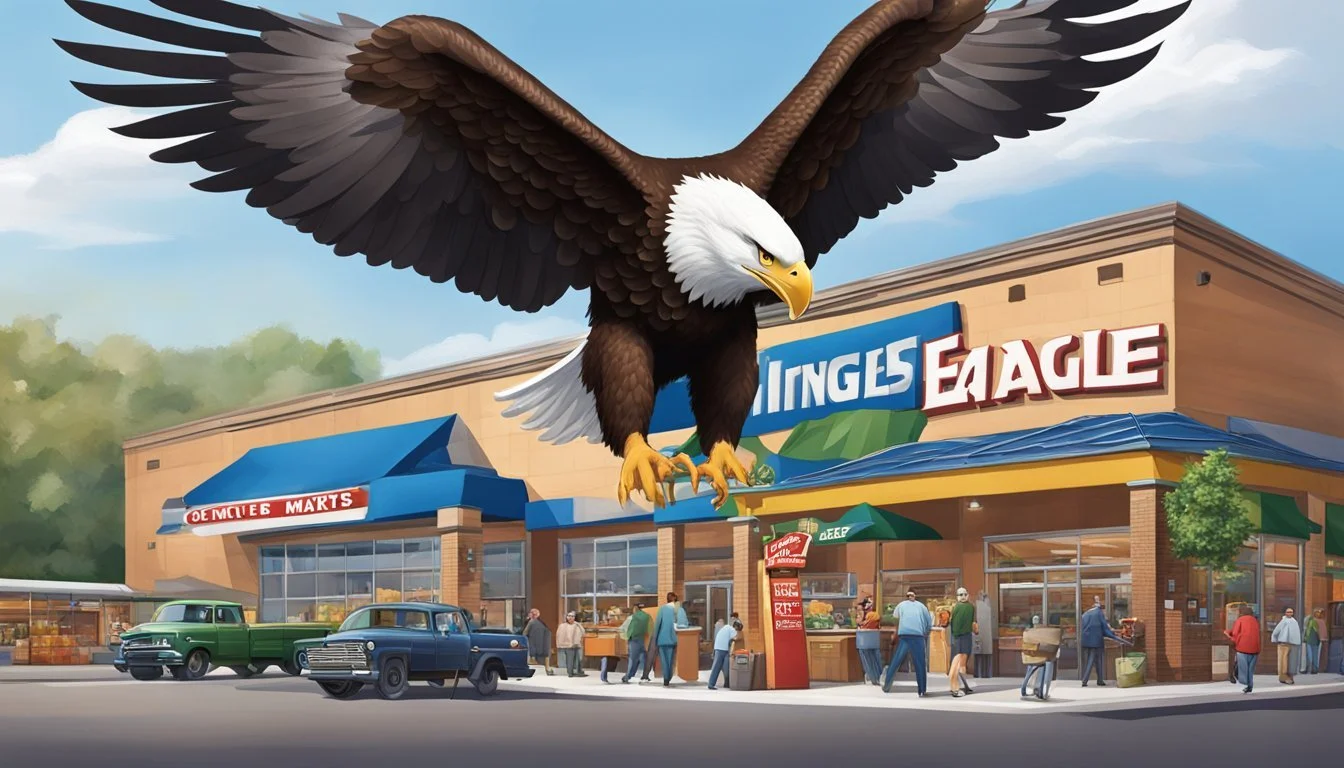Giant Eagle vs Ingles Markets
A Comprehensive Comparison of Quality and Value
When it comes to grocery shopping, consumers often compare different stores to find the best value and quality. Giant Eagle and Ingles Markets are two popular supermarket chains that serve different regions of the United States. Both offer a wide range of products and aim to provide customers with a satisfying shopping experience.
Giant Eagle primarily operates in the Midwest and Mid-Atlantic regions, while Ingles Markets serves customers in the Southeast. Both Giant Eagle and Ingles Markets offer competitive prices and a variety of products, making them solid choices for grocery shoppers in their respective areas. Each store has its own strengths and unique offerings that appeal to different customer preferences.
Comparing these two grocery chains can help shoppers make informed decisions about where to purchase their food and household items. Factors such as product selection, pricing, store layout, and customer service all play a role in determining which supermarket might be the better choice for individual consumers.
Company Backgrounds
Giant Eagle and Ingles Markets are prominent grocery chains with rich histories. Both have grown from humble beginnings to become major players in their respective regions.
History of Giant Eagle
Giant Eagle was founded in 1931 in Pittsburgh, Pennsylvania. Three families - Goldstein, Porter, and Chait - joined forces to create the company during the Great Depression. Initially, they operated as a small grocery business.
In the 1950s, Giant Eagle expanded rapidly, opening larger supermarkets. The chain introduced innovative concepts like fuelperks! rewards program in the early 2000s.
Today, Giant Eagle operates over 400 stores across Pennsylvania, Ohio, West Virginia, Indiana, and Maryland. The company remains family-owned and is known for its focus on customer service and community involvement.
History of Ingles Markets
Ingles Markets was established in 1963 by Robert Ingle in Asheville, North Carolina. Ingle aimed to provide fresh, high-quality products at affordable prices.
The company grew steadily throughout the Southeastern United States. Ingles went public in 1987, listing on the NASDAQ stock exchange.
As of 2024, Ingles operates nearly 200 supermarkets across six states: North Carolina, South Carolina, Georgia, Tennessee, Alabama, and Virginia. The chain is recognized for its emphasis on locally sourced products and its in-store pharmacies.
Ingles Markets has maintained its headquarters in Black Mountain, North Carolina, staying true to its Appalachian roots while expanding its reach across the East Coast.
Geographic Presence
Giant Eagle and Ingles Markets have distinct regional footprints that shape their market influence and customer base. Their store locations reflect strategic choices in targeting specific areas of the United States.
Giant Eagle's Regional Influence
Giant Eagle primarily operates in the Midwest and Mid-Atlantic regions of the United States. The grocery store chain has a strong presence in Ohio, where it was founded in 1931. Giant Eagle's supermarkets are also found in Pennsylvania, West Virginia, Maryland, and Indiana.
In Ohio, Giant Eagle maintains a significant market share, with numerous locations across major cities and smaller communities. The company's headquarters is located in Pittsburgh, Pennsylvania, which serves as another key market.
Giant Eagle's expansion strategy has focused on consolidating its position in existing markets rather than rapid nationwide growth. This approach has allowed the chain to build strong brand recognition and customer loyalty in its core regions.
Ingles Markets' Regional Impact
Ingles Markets concentrates its operations in the Southeastern United States. The grocery chain has a particularly strong presence in North Carolina, South Carolina, Georgia, Tennessee, Alabama, and Virginia.
Founded in Asheville, North Carolina in 1963, Ingles Markets has maintained its headquarters in the region. The company's stores are often found in suburban and rural areas, catering to local communities.
Ingles Markets has strategically positioned itself as a regional powerhouse, focusing on areas where larger national chains may have less saturation. This targeted approach has allowed Ingles to cultivate a loyal customer base familiar with its brand and offerings.
The company's distribution center in Black Mountain, North Carolina, supports its regional network of stores, enabling efficient supply chain management within its Southeastern footprint.
Product Range and Quality
Giant Eagle and Ingles Markets both offer extensive selections of groceries and fresh foods. The two chains prioritize quality and variety to meet diverse customer needs.
Produce and Meat Selection
Giant Eagle provides a wide array of fresh produce, including organic options. Their produce departments feature seasonal fruits and vegetables sourced from local farms when possible. The meat counter offers choice cuts of beef, pork, and poultry, with an emphasis on quality.
Ingles Markets also prides itself on fresh produce offerings. Their stores stock a variety of fruits and vegetables, with many locations featuring expanded organic sections. Ingles' meat departments are known for high-quality selections and often include specialty items like marinated meats.
Both chains maintain strict quality control measures for their produce and meats. Regular inspections and proper handling procedures help ensure freshness.
Bakery and Deli Offerings
Giant Eagle bakeries produce fresh breads, pastries, and cakes daily. Many locations have in-store cake decorators for custom orders. Their delis offer a range of sliced meats, cheeses, and prepared salads.
Ingles Markets features similar bakery and deli departments. Fresh-baked goods are available daily, including artisanal breads and desserts. Ingles' delis provide sliced meats and cheeses, along with hot food bars in some locations.
Both chains offer catering services through their bakery and deli departments, catering to various events and gatherings.
Dairy and Frozen Foods
Giant Eagle's dairy sections stock a variety of milk, yogurt, and cheese options. Their frozen food aisles include national brands and private label products across categories like vegetables, entrees, and desserts.
Ingles Markets offers comparable dairy and frozen food selections. Their stores feature both mainstream and specialty dairy products. The frozen food departments provide a mix of convenience items and healthier options.
Both chains work to keep dairy products fresh through efficient inventory management and proper storage practices.
Prepared Foods and Specialty Items
Giant Eagle has expanded its prepared foods offerings in recent years. Many stores now include hot food bars, salad bars, and grab-and-go meal options. Some locations feature in-store cafes or dining areas.
Ingles Markets has also increased its prepared foods selection. Their stores often include hot food bars and ready-to-eat meals. Some Ingles locations have specialty departments like sushi counters or in-store restaurants.
Both chains aim to cater to busy customers seeking convenient meal solutions. They regularly update their prepared foods menus to reflect current culinary trends and customer preferences.
Pricing and Affordability
Giant Eagle and Ingles Markets employ different pricing strategies to attract and retain customers. Their approaches to everyday prices, discounts, and loyalty programs can significantly impact shoppers' budgets.
Everyday Prices and Discounts
Giant Eagle's prices tend to be higher than some competitors like Walmart and Aldi. However, they often run weekly sales and promotions to offset higher base prices. Giant Eagle's "Low Price Lock" program guarantees certain staple items at competitive prices for extended periods.
Ingles Markets positions itself as a low-price leader in many of its markets. Their "Ingles Advantage Pricing" highlights items priced below competitors. Both chains offer digital coupons through their apps and websites, allowing customers to stack discounts on sale items.
Giant Eagle's "fuelperks+" program gives shoppers discounts on gas based on grocery purchases. Ingles partners with Shell for a similar fuel rewards program.
Membership and Loyalty Programs
Giant Eagle's free Advantage Card provides access to sale prices and personalized offers. Their "myPerks" program allows customers to earn points on purchases redeemable for discounts on groceries or gas.
Ingles' Advantage Savings Club card is also free and required for sale prices. Their "Ingles Advantage Savings & Rewards" program provides digital coupons and personalized offers based on shopping history.
Both stores offer senior discount days, typically 5% off on select days. Giant Eagle provides military discounts, while Ingles offers special savings for college students with valid IDs.
Customer Experience
Giant Eagle and Ingles Markets prioritize customer satisfaction through their store environments, service quality, and checkout processes. Both chains aim to create pleasant shopping experiences for families and individuals alike.
Store Ambiance and Layout
Giant Eagle stores often feature modern, spacious layouts with wide aisles and clear signage. The stores are typically well-lit and organized, making it easy for customers to navigate and find products. Giant Eagle's produce sections are usually prominent, showcasing fresh fruits and vegetables.
Ingles Markets tends to have a more traditional supermarket feel. Their stores are generally clean and well-maintained, with a focus on practicality. The layout is designed to be familiar and comfortable for regular shoppers, with staple items placed in predictable locations.
Both chains organize their groceries logically, grouping similar items together. This arrangement helps families efficiently complete their shopping lists.
Customer Service Quality
Giant Eagle emphasizes employee training to ensure helpful and knowledgeable staff. Associates are often readily available to assist customers with product locations or inquiries. The company encourages a friendly approach to customer interactions.
Ingles Markets prides itself on a personable, community-oriented service style. Staff members are typically locals who build rapport with regular customers. This approach fosters a sense of familiarity and trust among shoppers.
Both chains strive to maintain adequate staffing levels during peak hours to minimize wait times for assistance. Customer service desks are prominently placed in both stores to handle returns, exchanges, and special requests.
Checkout Efficiency
Giant Eagle invests in technology to streamline the checkout process. Many locations offer self-checkout options for customers with fewer items. The chain also implements queue management systems during busy periods to reduce wait times.
Ingles Markets focuses on traditional checkout lanes with attentive cashiers. While self-checkout may be available at some locations, the emphasis is on personal service. Cashiers are trained to be efficient while maintaining a friendly demeanor.
Both chains aim to keep checkout lines moving quickly. They often open additional lanes during peak shopping hours to accommodate increased customer flow. Loyalty programs at both stores allow for quicker transactions and personalized discounts.
Services and Amenities
Giant Eagle and Ingles Markets offer a range of services beyond traditional grocery shopping. Both chains strive to provide convenience and value through various amenities that cater to customer needs.
In-store Pharmacies and Clinics
Giant Eagle operates full-service pharmacies in many of its locations. These pharmacies offer prescription fills, immunizations, and medication consultations. Some stores feature walk-in clinics for minor health concerns.
Ingles Markets also provides pharmacy services in select stores. Their pharmacies offer prescription fills, flu shots, and health screenings. Ingles pharmacists are available to answer questions and provide medication advice.
Both chains prioritize customer health by offering competitive prescription prices and accepting most major insurance plans.
Online Shopping and Delivery Options
Giant Eagle embraces digital convenience with its robust online shopping platform. Customers can order groceries for home delivery or curbside pickup. The chain partners with Instacart for same-day delivery in many areas.
Ingles Markets offers online ordering and curbside pickup at participating locations. Their "Ingles Advantage" program integrates with digital coupons and personalized deals for added savings.
Both stores have mobile apps that allow customers to create shopping lists, view weekly ads, and manage prescriptions.
Special Services
Giant Eagle provides fuel perks through its GetGo gas stations. Customers earn discounts on gas based on grocery purchases. The chain also offers catering services and custom cake orders.
Ingles Markets features in-store delis with prepared meals and party platters. Many locations have dedicated spaces for community events and cooking demonstrations.
Both chains offer money services like Western Union transfers and bill payments. Gift card kiosks and coin-counting machines are available in most stores for added convenience.
Sustainability and Community Involvement
Giant Eagle and Ingles Markets have both implemented initiatives to reduce their environmental impact and support local communities. Their efforts focus on sustainable practices and strengthening ties with the areas they serve.
Environmental Initiatives
Giant Eagle has set ambitious sustainability goals. The company aims to achieve net-zero carbon emissions by 2040. They have started eliminating single-use plastics, including plastic bags, from their operations. Giant Eagle is also redesigning packaging for their private label products to use more biodegradable materials.
The grocery chain has implemented a chain-wide Grocery Stewardship Certification program. This initiative incorporates sustainability best practices in all stores, focusing on high-performance buildings and employee procedures.
Ingles Markets has also taken steps to reduce its environmental footprint. The company has invested in energy-efficient lighting and refrigeration systems in its stores. They have implemented recycling programs for cardboard, plastic, and other materials.
Local Community Support
Giant Eagle partners with local farmers and producers to source fresh, regional products. This supports the local economy and reduces transportation distances. The company also runs community-focused programs, including food bank donations and educational initiatives.
Ingles Markets emphasizes supporting local communities as well. They stock products from local suppliers and host farmers' markets in some store locations. The company contributes to local charities and sponsors community events.
Both chains offer customer loyalty programs that allow shoppers to support local schools and organizations through their purchases. These initiatives help strengthen ties between the stores and the communities they serve.
Financial Performance
Giant Eagle and Ingles Markets both operate as regional grocery chains, with distinct financial profiles and market positions. Their revenues, market shares, and expansion strategies offer insights into their respective business trajectories and competitive standings.
Revenue and Market Share
Giant Eagle generates annual revenues of approximately $10 billion, positioning it as a major player in the grocery industry. The company holds significant market share in its core operating regions of Pennsylvania, Ohio, West Virginia, and Maryland. Ingles Markets, while smaller in scale, reports annual revenues of around $4 billion. Ingles maintains a strong presence in the southeastern United States, particularly in North Carolina, South Carolina, Georgia, and Tennessee.
Giant Eagle serves about 5 million customers annually through its network of supermarkets and convenience stores. Ingles Markets caters to a smaller but loyal customer base, with a focus on rural and suburban communities.
Growth and Expansion Plans
Giant Eagle has pursued strategic growth through acquisitions and new store openings. The company has expanded its footprint in existing markets and entered new territories through targeted acquisitions. Recent initiatives include:
Investing in digital platforms and e-commerce capabilities
Expanding its GetGo convenience store brand
Piloting new store formats to capture different market segments
Ingles Markets adopts a more conservative expansion approach. The company focuses on:
Organic growth within its established markets
Renovating existing stores to enhance customer experience
Expanding its private label offerings to increase profit margins
Both chains prioritize modernization efforts to stay competitive in the evolving retail landscape.
Reputation and Customer Perception
Giant Eagle and Ingles Markets have established distinct reputations in the grocery industry. Consumer feedback and industry recognition play crucial roles in shaping public perception of these chains.
Brand Ratings and Awards
Giant Eagle has received recognition for its commitment to sustainability. The company earned a place on Newsweek's America's Most Responsible Companies list in 2021. This accolade highlights Giant Eagle's efforts in environmental stewardship and corporate social responsibility.
Ingles Markets, while less prominent in national rankings, has garnered local praise. The chain has been recognized for its community involvement, particularly in rural areas where it operates. In 2020, Ingles received the North Carolina Retail Merchants Association's Retailer of the Year award.
Both companies have implemented food safety measures that meet or exceed FDA standards, enhancing customer trust in their products.
Customer Surveys and Feedback
Consumer Reports' supermarket rankings provide insight into customer satisfaction. In recent years, Giant Eagle has faced challenges in these surveys, ranking lower than some competitors. Customers have cited concerns about pricing and product selection.
Ingles Markets generally receives more favorable feedback in local markets. Shoppers appreciate the chain's focus on regional products and its efforts to support local farmers. Customer reviews often highlight the friendly atmosphere in Ingles stores.
Both retailers have invested in loyalty programs to improve customer retention. Giant Eagle's fuelperks+ program and Ingles Advantage Card offer shoppers ways to save on groceries and gas, influencing positive customer perceptions.
Conclusion
Giant Eagle and Ingles Markets both offer quality grocery shopping experiences with their own strengths. Giant Eagle excels in its larger store formats and wider product selection. The chain also provides a robust loyalty program for regular shoppers.
Ingles Markets shines with its focus on locally-sourced products and in-store dining options. The company's emphasis on fresh produce and meats appeals to health-conscious consumers.
Price-wise, both stores offer competitive rates, though specific deals may vary by location and season. Customer service levels are generally comparable between the two chains.
The choice between Giant Eagle and Ingles Markets ultimately depends on individual preferences and priorities. Shoppers seeking a vast array of options may lean towards Giant Eagle. Those valuing local connections and fresh offerings might prefer Ingles Markets.
Both stores maintain high food safety standards and provide reliable shopping experiences. Customers can feel confident in the quality of products at either chain.
In the end, both Giant Eagle and Ingles Markets serve their communities well as dependable grocery options.










